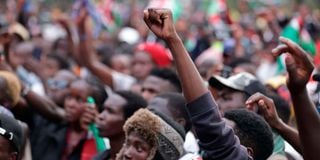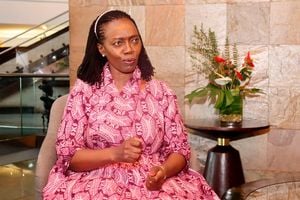A tale of two nations: What Kenya can learn from Sri Lanka's governance journey

Youths attend the Shujaa Memorial Concert at Nyayo Gardens in Nakuru Town on July 28, 2024 in remembrance of those who lost their lives during the anti-government protests in the country.
The recent announcement by the Kenyan government requesting an International Monetary Fund (IMF) governance diagnostic marks a pivotal moment in our nation's economic governance.
While presented as a voluntary initiative, this move comes amid delayed financing programmes and a pending $300 million (Sh38.8 billion) disbursement.
For many Kenyans struggling with soaring living costs and dwindling opportunities, this development raises a crucial question: Can such interventions truly address our governance challenges?
Learning from Crisis: The Sri Lankan mirror
Sri Lanka's recent experience offers both cautionary tales and innovative solutions that deserve our attention.
Like Kenya, Sri Lanka grappled with widespread corruption, institutional capture, and public outrage. Their story culminated in the worst financial crisis in their history in 2021-2022, with fuel shortages, power cuts, and collapsing public services.
While Kenya hasn't reached this crisis point, the parallels are striking. Both nations have seen youth-led protests demanding accountability - Sri Lanka's "Aragalaya" movement mirrors our recent demonstrations against the high cost of living and controversial finance bill.
From Street Protests to Policy Reform
The challenge facing both Kenya and Sri Lanka is how to translate street protests into lasting institutional change. Sri Lanka's experience offers a valuable model for Kenya's civil society organizations.
When Sri Lanka's Aragalaya protests began losing momentum, civil society organizations stepped in strategically. They reframed economic grievances as governance issues, engaged directly with international financial institutions, and created parallel monitoring mechanisms through their civil society governance diagnostic.
Most importantly, they developed innovative financial instruments like the Governance-Linked Bonds. Kenya's civil society can adapt this approach.
Recent protests over the finance bill and cost of living created public momentum - but sustaining it requires structured engagement. Our advantage lies in established civil society networks and digital capabilities.
By combining grassroots mobilization with technical expertise, Kenyan civil society can develop independent monitoring frameworks, engage proactively with the IMF diagnostic process, and create digital platforms for public participation in governance reforms.
Kenya's window of opportunity
The key difference lies in timing. Kenya's proactive request for a governance diagnostic presents an opportunity to prevent, rather than react to, a full-blown crisis. Sri Lanka's civil society innovations emerged from necessity; we have the luxury of learning from their experience.
Innovative Solutions from the Global South?
Two groundbreaking initiatives from Sri Lanka deserve particular attention in the Kenyan context.
First, their civil society produced the world's first independent governance diagnostic, which successfully shaped the IMF's own assessment and program conditions.
For Kenya, where civil society organizations already actively monitor public spending and corruption, this model offers a framework for constructive engagement with international financial institutions.
Second, Sri Lanka pioneered the concept of Governance-Linked Bonds (GLBs), which tie debt service to governance improvements. As Kenya manages its own debt obligations, this innovative financial instrument could provide a template for aligning creditor interests with governance reforms.
Unique advantages
Kenya's circumstances differ in important ways. Our tech-savvy population and vibrant digital economy provide tools for governance monitoring that weren't available to Sri Lanka. Initiatives like budget tracking apps and corruption reporting platforms could enhance the effectiveness of governance reforms. Moreover, Kenya's more robust democratic institutions, despite their challenges, offer stronger foundations for reform.
The Human Cost of Governance Failures
For Kenya's middle class, the stakes couldn't be higher. When governance fails, it's not just abstract numbers on a spreadsheet - it's the rising cost of unga, the struggle to fuel our cars, and the growing burden of taxes. For our youth, it's the difference between opportunity and despair.
Civil society's role
The innovation emerging from Sri Lanka's crisis offers hope, but also a warning. Their civil society found creative ways to engage with international financial institutions and creditors, turning technical financial instruments into tools for democratic accountability. Kenya's civil society, with its strong track record of public interest advocacy, could adapt and enhance these approaches.
This structured approach ensures that calls for "system change" evolve from street slogans into actionable reforms. By building coalitions between street protesters and policy experts, civil society can maintain the momentum for change while translating it into concrete governance improvements.
Call to Action
For government officials reading this, the message is clear: proactive governance reforms aren't just good politics— they're essential for preventing economic crisis. For our middle class and youth, engagement with these reforms isn't optional, it's survival. And for our international partners, Kenya's willingness to undertake this governance diagnostic deserves robust support and recognition.
Sri Lanka's civil society showed that even in the darkest moments, innovation and engagement can light the way forward. Kenya has the chance to write a different story - one of prevention rather than crisis, of proactive reform rather than reactive survival. The tools are available, the lessons are clear, and the time to act is now.
Authors:
• Alvin Mosioma, Associate Director, in the Economic and Climate Prosperity team at Open Society Foundations
• Savior Mwambwa, is Program Manager in the Economic and Climate Prosperity team at Open Society Foundations
• Nikhil Wilmink, is Program Manager in the Networks Grants team at Open Society Foundations
• Nishan de Mel is Executive Director at Verite' Research Sri Lanka




